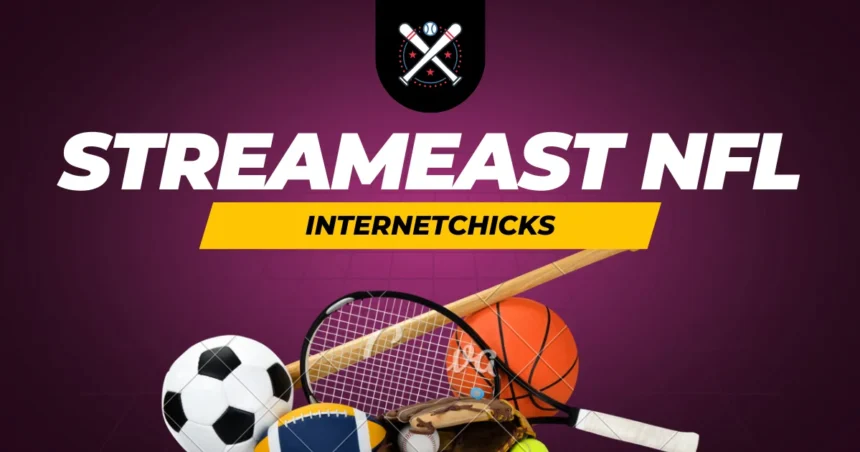Streameast NFL: Streameast was an online streaming aggregator that became notorious in sports fan circles because it offered free, near-live access to major sporting events, including NFL games, without requiring subscriptions. Rather than hosting content itself, Streameast acted as a directory or index: it would collect and embed third-party streaming links and mirror sites, organize them by league, date and match, and let users click through to whichever link was streaming at the moment. For NFL fans, this meant access to Sunday games, primetime matches, possibly Red Zone or highlight streams, etc., all without paying for the official rights.
Because the NFL’s official streams are split across networks and paid platforms (for example, Sunday Ticket, RedZone, NBC, ESPN, Amazon for Thursday Night, etc.), many fans turned to Streameast as a “one-stop” for games they otherwise would have to juggle across multiple services. Over time, Streameast’s traffic grew extraordinarily — the platform (or network of domains) reportedly drew 1.6 billion visits in one year. That scale made it arguably the largest illegal live sports streaming hub in the world.
However, this convenience came with many hidden dangers and legal risks, which we’ll dig into next.
Legal and Copyright Risks in Streaming NFL via Streameast
One of the core issues with Streameast was that it typically operated without authorization or proper licensing from the rights holders (e.g. the NFL, broadcast networks). Even though Streameast didn’t always host content, merely aggregating and linking to pirated streams is frequently considered copyright infringement under many jurisdictions’ laws. The legal status varies by country, but in places like the U.S., using or facilitating unlicensed streaming of copyrighted works can expose operators (and sometimes users) to civil or even criminal liability.
For example, in the U.S. the Protecting Lawful Streaming Act (2020) makes large-scale unauthorized streaming of copyrighted content a felony in certain cases. While that law primarily targets operators rather than individual viewers, it underscores how seriously authorities are treating digital piracy.
Users of Streameast also risked ISP penalties, such as warnings, bandwidth throttling, or service suspension if their provider monitors and flags “pirate stream” traffic. In some countries, copyright holders have compelled ISPs to block access to offending domains.
In short: while many users saw Streameast as a “free alternative,” there were real legal and regulatory dangers behind the convenience.
Security, Privacy & Technical Dangers for Users
Beyond the legal domain, Streameast posed significant security and privacy risks to users. Because it was not an official or regulated service, it often:
- Showed intrusive, aggressive advertisements, pop-ups, redirect links, and sometimes malicious scripts. Clicking the wrong thing could lead to malware downloads.
- Lacked transparency in privacy policies or terms of service; users could unwittingly have their data (IP addresses, browsing history) collected or sold.
- Exposed users to phishing risks, where fake “login” or “verification” pop-ups tricked them into supplying sensitive info.
- Suffered from unreliable streaming quality, buffering, dropped streams, missing games, or broken links, especially during high-traffic moments.
- Operated via frequently changing domains and mirror sites, meaning the “official” URL could suddenly be unreachable or taken down.
A user on Reddit observed:
“Sites like StreamEast come with significant risks to your device security, personal data, and potentially your legal standing.”
So even from a purely technical or security standpoint, using Streameast was fraught with hazards much more severe than what you’d face using a legitimate streaming service.
Shutdown Operation: Streameast Takedown & Aftermath
In 2025, authorities and anti-piracy coalitions struck a blow against Streameast. In a joint operation involving Egyptian law enforcement and the Alliance for Creativity and Entertainment (ACE), multiple Streameast domains were seized, and two men were arrested in Egypt. The operation reportedly uncovered connections to shell companies based in the UAE that laundered over $6 million in advertising revenue from pirated streams.
After the takedown, the main Streameast domain was disabled. However, mirror sites and copycat domains quickly proliferated, many claiming to be the “new Streameast.” Analysts cautioned that shutting one domain is like playing whack-a-mole: new ones arise to fill the void.
Some reports note that the original Streameast “.net” domain remained partially operational or that fragments of the infrastructure lingered. Meanwhile, all seized domains were redirected to ACE’s “Watch Legally” page—a campaign urging fans to stop piracy and use authorized services
Even after the shutdown, users claimed to still find working Streameast-style links — some were outright fakes or clones. In short: the takedown substantially disrupted the infrastructure, but did not fully eliminate the ecosystem of illegal streams.
Impact on NFL Fans & the Sports Streaming Ecosystem
The Streameast takedown had a ripple effect across the NFL fan base and the broader sports streaming landscape.
For NFL fans:
- Those who relied on Streameast were suddenly left without a free go-to platform to stream all games in one place.
- To watch NFL now, fans must subscribe to multiple legal services: Sunday Ticket / RedZone, ESPN / ABC (for Monday Night / some games), Amazon Prime (Thursday Night), Peacock, Paramount+, Fox, etc.
- The cost of legally streaming every NFL game can exceed what many users are comfortable paying, so some fans may seek alternative (illicit) options again, risking exposure.
For rights holders and anti-piracy bodies:
- The disruption reinforces the message that large piracy networks can be targeted and dismantled, raising the cost and risk for operators.
- But it also underscores a broader structural issue: when legal streaming is fragmented and expensive, fans feel incentivized to search for “free” alternatives.
- As Streameast falls, other piracy platforms may rise to fill the gap — making it a continuing arms race.
- The takedown also strengthens collaboration between global entities (governments, copyright coalitions) in policing digital piracy.
So while the takedown is a victory, it’s far from the end of illegal streaming in the sports world.
Safer Legal Alternatives to Stream NFL Games
With Streameast largely disabled, NFL fans have to rely on legitimate platforms. Here are some major legal alternatives:
| Platform / Service | What NFL Content It Carries | Notes / Limitations |
|---|---|---|
| NFL+ / NFL Game Pass (International) | Many games live or on demand, RedZone, NFL Films | Availability depends on country; in U.S., NFL+ has carriage restrictions |
| ESPN / ABC | Monday Night Football, selected games | Subscription required |
| Amazon Prime Video | Thursday Night Football | Prime membership or audio subscription |
| Peacock | Sunday Night Football | Requires Peacock subscription |
| Paramount+ / CBS | AFC & NFC over-the-air games on CBS | Geographical restrictions |
| Fox / FOX streaming apps / Fox One | NFC / Fox network games | Must have access (via subscription or TV provider) |
| Cable / Satellite packages | Bundled NFL access | Traditional but often costly |
| Local over-the-air / antenna | Local markets’ games | Only works if game is broadcast locally |
When choosing the right mix, fans must balance cost, coverage, and availability in their region. Legal services offer reliable quality, customer support, and peace of mind (no risk of legal or security problems).
Conclusion
Streameast may have been a tempting shortcut for NFL fans looking to catch every game without subscribing to multiple services. But the risks—legal exposure, malware, stolen data, unpredictability—were significant. Its 2025 shutdown by law enforcement and anti-piracy agencies marks a major blow to organized sports piracy. Yet, it doesn’t close the book on piracy altogether.
For fans today, the safest path is to rely on legitimate streaming platforms, even if it takes a bit more planning or cost. Bundling services, choosing the ones covering your favorite teams, or using official apps can give you high-quality, legal access with far fewer hazards.








